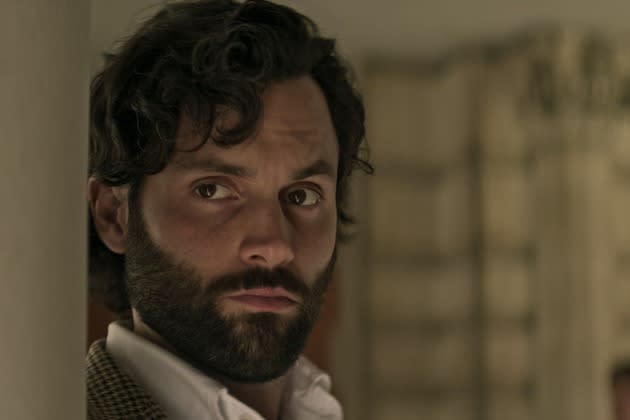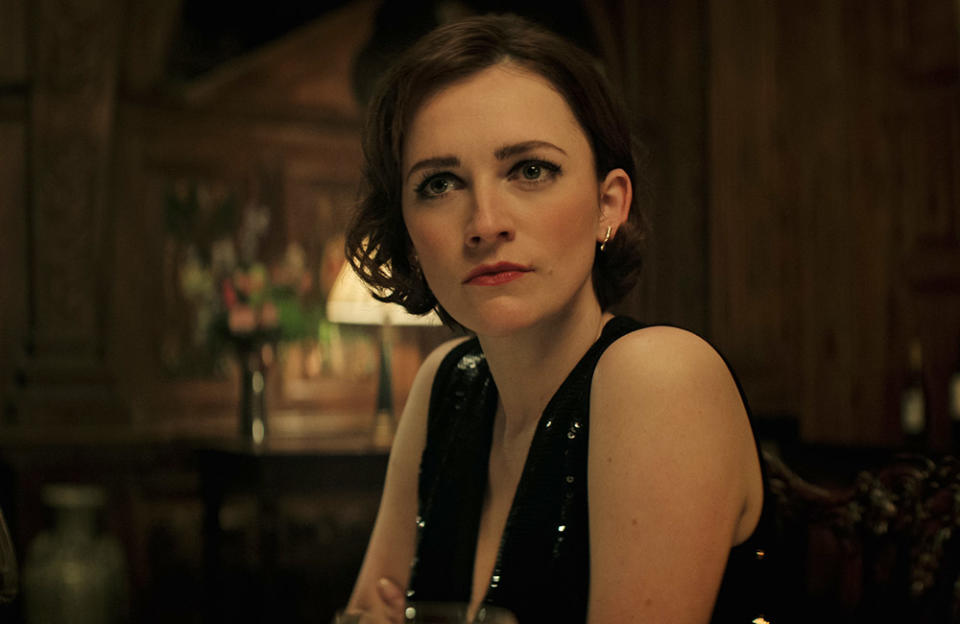‘You’ Star Penn Badgley Says Joe Had “the Most Compelling Reasons” to Change After Part 1 Finale

[This story contains major spoilers for You season four, Part 1.]
Joe Goldberg takes You fans on a wild ride in the first half of season four. Except this time, he’s in the passenger’s seat and another killer is driving.
More from The Hollywood Reporter
'Perfect Match' Boss on Giving Netflix Reality-Show Standouts Another Chance at Love
'Queen Charlotte' Makes Her Debut With Trailer, Release Date for 'Bridgerton'-verse Prequel Series
The new 10-episode season of the hit Netflix series starring Penn Badgley — which is broken into two parts this time around, with the first five episodes now streaming — sees Joe attempting a murder-free European holiday that doesn’t last very long.
The first episode catches viewers up after the events of the third season finale, which sent Joe fleeing L.A. for Europe in search of Marienne (Tati Gabrielle), after killing his wife Love (Victoria Pedretti) and leaving their son behind. When Marienne realizes she’s being followed by Joe in London, audiences are convinced that, in true You fashion, she’s going to wind up in one of his now-infamous boxes. But when she calls him a killer, he lets her go to show her she’s wrong, sending her back to Paris where she lives with her daughter.
Over the course of the next five episodes, Joe — who has changed his identity and now goes by professor Jonathan Moore — falls into a group of “the most insane, damaged people on earth, a circle of privileged douchebags,” one of whom ends up dead on his dinner table halfway through episode one. Viewers may immediately look to Joe as the culprit — he thought he did it, too, after a night of excessive drinking. But the show’s protagonist finds out someone’s trying to frame him for murder. The mysterious person begins texting Joe, threatening to out his secret life, and he’s convinced it’s one of the people in his new circle of friends.
On the outside looking in, all signs point to Joe, especially as another member of the group shows up dead. With two now dead from the elite London group, the press labels the murderer, the “Eat the Rich killer.” Joe’s on the hunt for the real culprit, who he eventually finds out is Rhys Montrose (Ed Speleers), indeed one of the new friends and the only one Joe respected, and who is now blackmailing him.
Meanwhile, Joe struck up a romance with another group member, Kate (Charlotte Ritchie). Her bodyguard became another victim of Joe’s, after he accused Joe of being the killer.
So, as much as Joe tries to change, Badgley says it’s not so easy. “The reality of somebody who kills people is that it’s hard to change, because what you’re having is a response to this deep-grained belief that had to have started in early, early life,” Badgley tells The Hollywood Reporter of where showrunner Sera Gamble and the writers take Joe in season four. “Your nervous system, your brain, your heart, your mind, everything about you is wired to believe that you’re constantly in threat. You’re constantly in danger.”
In the conversation below, Badgley opens up about the season four shift of his stalker becoming the one who is stalked, and what the Part 1 finale reveal says about Joe and his new enemy when You returns March 9 with Part 2.

At the beginning of season four, like the previous starts of You, it seems like Joe genuinely wants to be better. We even see him let Marienne (Gabrielle) go and it appears he’s turned over a new leaf. What contributed to that desire to change?
I don’t think anything truly profound has changed Joe. I think that part of what the show is doing is showing that he’s never really looking at himself. No matter what happens, actually, he seems to be incapable. It is hard for anybody. And then once you’ve done some really terrible things, it’s even harder. He seems to be positioning himself to make a different change, but everybody is, of course, always wondering when the other shoe is gonna drop. Like, it’s Joe. The [way the] whole thing really works, to put him in London and depict him trying to turn over a new leaf, is because we know he’s not really capable of that. So, we’re just waiting with bated breath to see exactly when and how.
But I think that he’s got the most compelling reasons that he’s ever had to “change.” At the end of season three, he killed his wife, burned down his house and faked his own death. He can’t even be himself anymore. He has to at least superficially change. And change he has. Now he has the beard, the hair, the name, the clothes, the country, the job. But I guess the question really is, throughout Parts 1 and 2: Can he change? Or, what does change actually mean for a person like him?
At the end of the first episode, we see that Malcolm (Stephen Hagan) has been murdered in Joe’s apartment and fingers point at Joe. But then comes the mysterious texter who has apparently been stalking Joe. Why was it important to flip the script this season, and have the role reversal of Joe being stalked?
The writers always figure out how to reinvent the wheel of our show. It’s a tough concept to let get tired. I think jumping the shark on our show is a lot more grotesque than jumping the shark on another. Or even just letting the concept get a bit tired, I think, is tougher on ours. It’s more irresponsible on ours. It would just be worse. So I always marvel at how they’re able to reinvent it just enough in the right way.
For Joe to be hunted — and not just for a moment by Love — but for him to be in a condition, in a state of retreat and confusion, I think it’s probably refreshing and rewarding for viewers because it’s a position he puts other people in all the time. As an actor, putting him alongside another killer or man, both of those things are nice because he’s always the most uncomfortable around other people who are killers or men in general — which is not that often, but it has happened. I like it when he has some male peers. And I like it when he’s in danger.

As a viewer, I did find it refreshing that things are different this time around. But throughout the season, we see Joe slowly resort to his old ways — like when he kills Vic (Sean Pertwee), for example. Why do you think he can’t ever change?
It’s a pretty human folly to not be able to change enough so that you can fill in the blank. I think the question at hand really is, how much can people change? I personally believe they can change a lot more than most stories give human beings credit for. But that’s kind of a separate conversation. The reality of somebody who kills people is that it’s hard to change because what you’re having is a response to this deep-grained belief that had to have started in early, early life. Your nervous system, your brain, your heart, your mind, everything about you is wired to believe that you’re constantly in threat. You’re constantly in danger.
For people to change, period, is possible and good, but hard. For people who’ve done something really, truly terrible is basically because something terrible has happened to them — it’s like what the sciences say about people in relationships. You don’t just abuse someone randomly, you do it because you’ve been abused in some manner, and it’s hard to stop those cycles. It seems difficult to stop those cycles, for anybody.
Over the course of Part 1, Joe tries to stay away from Kate (Ritchie) out of fear that he’ll hurt her, which shows some progress. What about her draws him in so much?
She’s a much different vibe from anyone he’s seen — even just that aspect of a foreigner to him, being in a different culture. Even I was surprised moving to London for six months how different it really does [seem]. Until you live there, you don’t really know how different British culture is from American. So, I think that’s what he’s getting, in a micro-macro way. He’s just sort of perplexed and doesn’t really understand what the dynamic is between them. And I think that’s what keeps him unable to look away: It’s a new shiny thing, and he’s purely objectifying everyone around him. She’s the new shiny object he can’t figure out. So, it’s not boring yet. And then, once he starts to get to know her, what draws him in, at least according to him — Joe being the most unreliable narrator, maybe in all of storytelling — he says he’s drawn in because she seems like she wants to be good. She’s surrounded by bad people and wants to be good. And he feels the same way. But, that’s what he says. I don’t know if that’s true.

In the midseason finale, we find out Rhys is the one who’s been texting Joe and is the one who killed Malcolm, Simon (Aidan Cheng) and Gemma (Eve Austin). What were your thoughts when you first read that in the script? And what are the similarities between them?
I love the character of Rhys and I love Ed Speleers as an actor, because he’s actually quite different from me. And for all the similarities they share, they are quite different predators. They’re different stalkers. They’re different killers. They’re different men. They share the same key similarities, but in a lot of ways, they’re different. Their packaging is very different. So, it’s interesting to see that clash.
For me as an actor, I’m always excited when another strong male character comes in because, actually, there’s not that many of them. We have a lot of women and a lot of strong women — despite the whole Joe weakness thing, or whatever you wanna call that where they all end up in a cage somehow. But there aren’t that many men. Every season, you see one or maybe two key male relationships. And for me as an actor, they’re often quite fun because it’s where Joe is the most challenged. Unfortunately, he’s a really consistent, successful predator with women. With men, he’s out of his element and he feels threatened. Or, he wants actual male intimacy, which is a bit of a mystery for all men. So I love that relationship, and I especially love how it develops over Part 2.
You season four, Part 1 is streaming now on Netflix. Part 2 releases March 9.
Interview edited for clarity.

 Yahoo News
Yahoo News 
